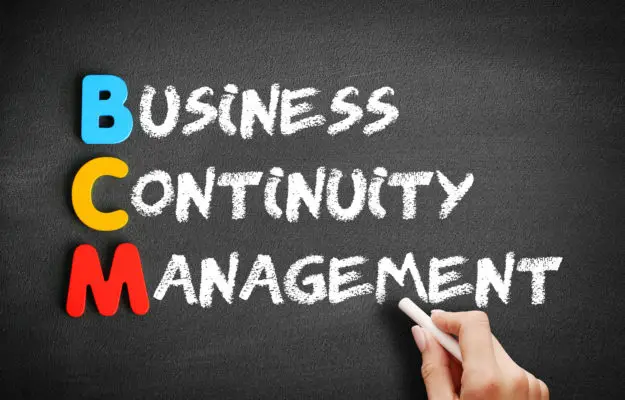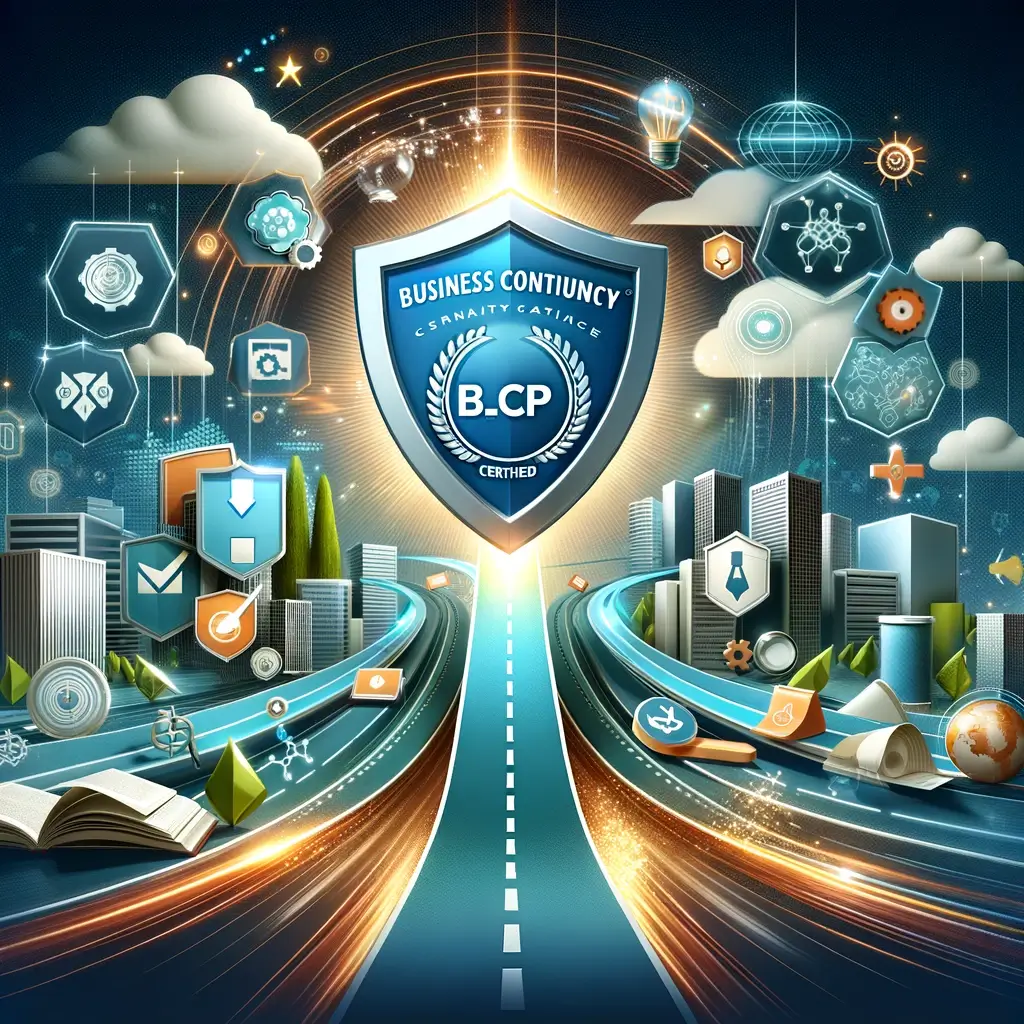The Business Continuity Certified Planner (BCCP) is an entry-level certification in the field of Business Continuity Management (BCM).
It is designed for individuals who are looking to gain a foundational understanding of BCM principles and practices. To earn the BCCP certification, candidates typically need to complete a course of study and pass an examination that covers various aspects of business continuity planning.
The course usually includes risk assessment, business impact analysis, business continuity strategies, plan development and implementation, testing and exercises, and program management.
The BCCP certification is internationally recognized and can be a stepping stone for professionals aiming to build a career in business continuity and related fields.
For more specific details on what the BCCP course entails and the prerequisites for certification, you can refer to the BCM Institute’s page on the Business Continuity Certified Planner (BCCP).
This certification is part of a structured learning path and can lead to more advanced certifications for those who wish to further their expertise in business continuity management.
In today’s risk-laden environment, the resilience of business operations is paramount to an organization’s sustainability and success.
The Business Continuity Certified Planner (BCCP) course addresses this need by equipping professionals with the foundational knowledge to develop and manage a Business Continuity Management (BCM) program.
The certification is internationally recognized and testament to an individual’s understanding of key concepts and best practices in maintaining business continuity.
The BCCP course is structured to guide individuals through the intricacies of creating robust Business continuity plans and strategies.
It covers all phases of the business continuity planning cycle, from conducting business impact analyses to implementing response strategies that ensure critical functions can continue during and after a disruption.

This training is essential for professionals aiming to certify their ability to safeguard an organization’s operational resilience.
Key Takeaways
- The BCCP certification lays the groundwork for professionals to support business resilience.
- A comprehensive curriculum covers all fundamental aspects of business continuity planning.
- Strategic implementation and ongoing management are essential to a program’s success.
Understanding Business Continuity
Business Continuity Management (BCM) is a framework that identifies an organization’s risk of exposure to internal and external threats.
The goal of BCM is to provide the organization with the ability to effectively respond to threats such as natural disasters or data breaches and protect the business interests of the organization.
Fundamentals of Business Continuity Management
The fundamentals of BCM involve a comprehensive approach to organizational resilience. BCM is built upon the understanding that while it is impossible to eliminate all risks, proactively managing the potential impact of disastrous events is essential.
This management includes the development of policies, procedures, and actions that keep critical functions and processes operational during and after a disruption.
The Role of a Business Continuity Certified Planner
A Business Continuity Certified Planner (BCCP) is tasked with developing and maintaining a business continuity plan (BCP). They ensure that essential functions can continue during disruption and are recovered to operational states in a predefined timeframe.
These practitioners are skilled in the Business Continuity Management Body of Knowledge and understand how to apply it to their organizational context.
Key Concepts and Body of Knowledge
The BCM Body of Knowledge encompasses a range of key concepts, including risk assessment, impact analysis, strategy development, plan development, and plan testing.
It also involves maintaining and improving the BC program over time. Understanding these concepts is vital for effective business continuity planning.
Professional Practices for Business Continuity
Professional practices in BC include the established standards and practices that guide BCM professionals in executing their responsibilities.
These practices involve the identification of organizational risks, the implementation of strategies to mitigate these risks, and the development of plans that allow for business continuity in response to incidents. They are iterative in nature and are continually improved as organizational needs evolve.
Certification Process and Examination
The Business Continuity Certified Planner (BCCP) provides a structured pathway for professionals to gain recognized business continuity management credentials.
The certification ensures that individuals have met rigorous standards through education, experience, and examination.
BCCP Certification Requirements
To be eligible for the BCCP certification, candidates must demonstrate a foundational understanding of business continuity management. They are typically required to:
- Complete relevant educational coursework, providing a solid foundation in business continuity principles.
- Acquire experience in the field, equipping them with practical skills essential for implementing effective business continuity strategies.
Examination Details
The BCCP examination assesses an individual’s knowledge and understanding of business continuity planning. Key aspects of the examination include:
- Format: Multiple-choice questions covering essential business continuity topics.
- Duration: A set time limit is enforced to complete all examination questions.
Passing Score and Re-examination
The qualifying examination sets a benchmark that candidates must achieve to earn their certification:
- Passing Score: A minimum score is established; candidates must meet or exceed this threshold to pass.
- Re-examination: Should a candidate fail to achieve the passing score, policies are in place that allow them to retake the examination after a specified period or upon meeting certain conditions.
Planning and Strategies
The core of any successful Business Continuity Certified Planner (BCCP) course revolves around comprehensive planning and developing robust business continuity strategies.
Through a systematic approach, one learns to assess potential impacts on business operations and manage risks, ensuring an organization’s resilience and recovery capabilities.
Business Impact Analysis
Business Impact Analysis (BIA) is a cornerstone of business continuity planning. It involves methodically examining each business function to determine the potential consequences of a disruption.
This process is critical, as it identifies key business areas, quantifies the impact of losses, and sets the recovery time objectives (RTOs).
- Essential functions: Pinpointing functions that are critical to operations.
- Impact: Quantifying the potential financial and non-financial impacts over time.
Risk Assessment and Management
Risk Assessment and Management are fundamental steps in understanding the threats to an organization’s success.
A BCCP equips one with the knowledge to conduct comprehensive risk assessments and develop risk management strategies that directly influence an organization’s resilience.
- Threat identification: Recognizing threats that could cause disruptions.
- Risk levels: Assigning likelihood and impact levels to each identified risk.
Business Continuity Strategies and Plans
Developing Business Continuity Strategies and Plans is the ultimate goal of a Business Continuity Certified Planner. These encompass the tactical steps and arrangements needed to safeguard and restore business operations following a disruption.
- Strategies: Establishing protocols to manage and respond to incidents.
- BCM Plan: Drafting the Business Continuity Management Plan, aligning it with organizational goals.
- Recovery strategies: Outlining measures to recover critical business functions within the defined recovery time objectives.
- Business continuity plans: Implementing plans that coordinate efforts across the organization, ensuring business process recovery.
Implementation and Management
In Business Continuity Planning (BCP), successful implementation and operational management are paramount. They ensure that when disruptions occur, organizations can maintain critical functions.
This section details the essential components and methodologies for developing robust continuity plans and managing recovery procedures.
Developing BCM Programs
A well-structured Business Continuity Management System (BCMS) is foundational to the BCP process. One begins by adhering to standards such as ISO 22301 BCMS, which outlines the requirements for a management system to protect against, reduce the likelihood of, and ensure your business recovers from disruptive incidents.
The BCM-200 is often a stepping stone for professionals seeking expertise in this field. As one progresses toward the BCCP certification, understanding the nuances of BCM program development, including the analysis of business impacts and risk assessments, becomes crucial.
Operational Management and Recovery Procedures
For operational management, a BCM manager defines critical operations and establishes recovery strategies to ensure the continuity of these functions. They devise detailed recovery procedures, anticipating various disaster scenarios.
The Business Continuity Certified Planner (BCCP) is trained to create a coherent framework for operational resilience, emphasizing a swift return to business-as-usual or acceptable predefined levels of operation following an interruption.
Continuity Management System and Audit
An integral part of a Business Continuity Management System is periodic reviewing and auditing. This ensures the system’s effectiveness and compliance with established standards, such as ISO 22301.
A thorough BCM audit assesses policies, practices, and procedures, identifying areas for improvement. These audits provide organizations with the confidence that their continuity management system is current and effective in the face of potential business disruptions.
Advanced Business Continuity Planning
Advanced Business Continuity Planning extends beyond foundational concepts by delving into strategic planning and engagement with senior management, ensuring that organizations can withstand and recover from disruptions.
Tailored courses and qualifications are essential for professionals aiming to master the intricacies of business continuity management systems (BCMS) compliant with ISO 22301 standards.
BCM-400 to BCM-5000 Courses
The course progression from BCM-400 to BCM-5000 is designed for professionals seeking comprehensive knowledge in business continuity. The BCM-400 level typically covers the foundation, while the BCM-5000 courses are geared toward those looking to become adept at designing and implementing a BCMS aligned with ISO 22301.
These courses are stepping stones towards becoming a Business Continuity Certified Planner with a clear pathway for growth and specialization.
Expert Implementer Qualifications
Individuals with Expert Implementer qualifications have proven their skills in creating and managing robust business continuity plans.
These professionals are often tasked with ensuring their organization’s continuity strategies are effective, current, and scalable. Essentially, they become the architects of resilience, capable of steering their organization through turbulent times.
Senior Management Engagement
Senior Management Engagement is pivotal to the success of any business continuity strategy. It ensures top-level support, vital for securing the resources necessary for plan development and execution.
By being actively involved, senior managers underscore the importance of BCM and facilitate a culture of continuity that permeates the entire organization. Their leadership is crucial in instilling the principles outlined by the Certified Business Continuity Professional across all departments and teams.
Studying and Course Logistics
In Business Continuity Management training, the Business Continuity Certified Planner (BCCP) course provides comprehensive e-learning resources, a transparent fee structure, and a straightforward application process; these are crucial elements students must consider.
E-Learning and Online Resources
The BCCP course leverages e-learning platforms to offer an accessible and effective online learning experience. Students receive login credentials once enrolled and can immediately access various online resources.
The BCM Institute provides fundamental courses through eLearning, facilitating learning flexibility and resource accessibility.
- Duration: Typically, 30 days of access to the eLearning materials.
- Content Delivery: Modular sub-units, each ending with quizzes to test comprehension.
Course Fees and Expenses
The course fee for the BCCP certification is integral to budget planning for prospective students. It includes the learning materials, examination, and certification costs.
- Fee for BCCP Certification: Typically charged in SGD, fees may vary and should be confirmed directly with the BCM Institute.
- Additional Costs: Should a student need a re-examination, each attempt may incur an extra fee, commonly around SGD150.
Application and Enrollment Procedures
Prospective students must complete an application form to enroll in the BCCP course. The process requires the payment of an application processing fee and the submission of the necessary documentation.
- Sign-Up: Fill out the application form through the BCM Institute’s website.
- Payment: Pay the course fee and any associated application fees.
- Confirmation: Receive acceptance and login credentials to start the eLearning program.
Continuing Professional Development
In Business Continuity, Continuing Professional Development (CPD) is essential to maintain relevance and stay updated with evolving industry standards. CPD ensures that professionals retain and enhance the knowledge and skills needed to deliver a professional service to customers, colleagues, and the community.
Maintaining Certification
Business Continuity Certified Planner (BCCP) designees must participate in continuous learning to retain their certification status.
The BCM Institute mandates certain continuing education units that professionals must complete within a set period.
This approach guarantees that individuals sustain competency and an up-to-date body of knowledge in the dynamic field of business continuity planning.
Ongoing Education
Professionals in this field often pursue formal education, such as the Certified Business Continuity Professional (CBCP) offered by DRI International, to deepen their understanding.
They may also attend workshops, seminars, and courses contributing to their ongoing education. This pursuit of knowledge helps them amass greater experience and supports their broader career progression.
Professional Networking and Growth
Engaging in professional networking events and connecting with peers is a cornerstone of one’s professional journey. Individuals have the opportunity to share insights, discuss challenges, and learn from the success stories within the community.
The growth from such interactions often extends beyond mere knowledge, fostering a valuable exchange of experience and innovation in methodologies.
Glossary and Acronyms
In Business Continuity Management (BCM), a clear understanding of terminology and acronyms is essential. This section provides an overview of the key terms related to Business Continuity and the various certifications, ensuring readers grasp the fundamental concepts and distinctions among different levels of certification.
Business Continity-Related Terminology
- BCM-300: A course that introduces the principles of business continuity and the requirements for a BCM program.
- BCM-5000: This advanced course provides in-depth knowledge on implementing and managing a comprehensive BCM program.
- BCM Fundamentals: The basic concepts and key elements that form the foundation of business continuity practices.
- SGD150: Often a pricing indicator for courses or exams, which may vary based on the institution and region.
Certification Acronyms and Their Meanings
- BCCP: Business Continuity Certified Planner, an entry-level BCM certification.
- BCCS: Business Continuity Certified Specialist, a certification for BCM practitioners with intermediate knowledge and skills.
- CL 1B, CL 2B, CL 3B: These may refer to various class levels within BCM certification programs or specific criteria within an exam or course structure.
- Business Continuity Certification: An umbrella term for various certifications that professionals can earn to validate their expertise and knowledge in BCM.
To become certified, individuals must pass an exam, which may include multiple choice questions, designed to assess their understanding of business continuity planning and management.
Additional Resources
When pursuing the Business Continuity Certified Planner (BCCP) certification, individuals can access various resources designed to deepen their understanding and assist them throughout the learning process.
These resources range from comprehensive reading materials to dedicated support channels, ensuring candidates can engage with the content effectively and reach out for assistance when needed.

References and Further Reading
- BCM Institute Materials: The BCM Institute’s official website offers in-depth information on the BCCP certification, including foundational concepts of BCM.
- E-Learning Options: For online students, thorough course details and online e-learning packages are available, allowing for a self-paced study environment.
- Examination Insights: Detailed FAQs about the BCCP and ISO22301 BCMS Planner courses can be found here, including information about multiple-choice questions and quizzes incorporated in the assessment.
- Certification Details: The process to obtain and renew the BCCP certificate and the recognition as a Business Continuity Certified Expert can be reviewed on the BCMI Learning Institute website.
Contact Information and Support
- BCM Institute Contact: For queries related to the BCCP course content, examinations, or certificates of completion, the BCM Institute provides contact information which can be found on their Contact Us page.
- E-Learning Support: Assistance for online learning programs and technical support details for e-learning courses are typically accessible through the learning platform or directly via the educational provider’s support channels.
Conclusion
Business continuity management is a crucial aspect of any organization’s strategic planning. Certification in this field affirms an individual’s expertise and dedication to maintaining organizational resilience.
The Business Continuity Certified Planner (BCCP) certification specifically caters to professionals beginning their journey in this domain. It offers them a foundational understanding of business continuity concepts and prepares them to tackle potential disruptions with confidence and competence.

Those who attain the BCCP credential are committed to their professional growth and their organization’s ongoing viability. They emerge as knowledgeable contributors, capable of designing and implementing business continuity strategies.
Furthermore, as the business landscape evolves and challenges become more complex, the knowledge gained through the BCCP certification remains relevant. It equips professionals with methodologies adapted to diverse scenarios, ensuring they can protect their organizations against various risks.
In essence, gaining the BCCP is a stepping stone towards becoming a proficient business continuity professional. It benefits the individual, their workplace, and the broader field of business continuity management.

Chris Ekai is a Risk Management expert with over 10 years of experience in the field. He has a Master’s(MSc) degree in Risk Management from University of Portsmouth and is a CPA and Finance professional. He currently works as a Content Manager at Risk Publishing, writing about Enterprise Risk Management, Business Continuity Management and Project Management.


